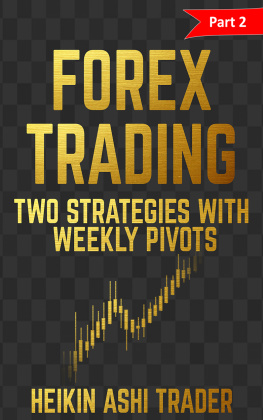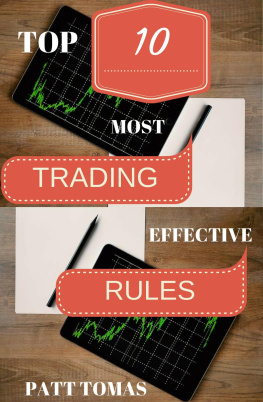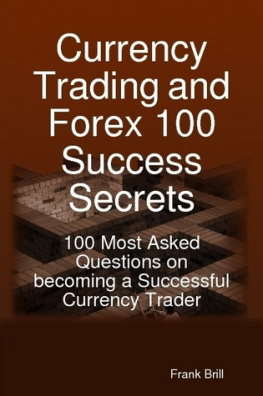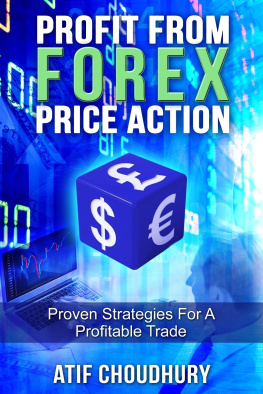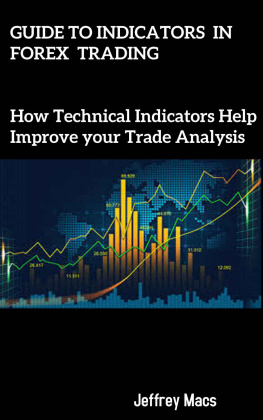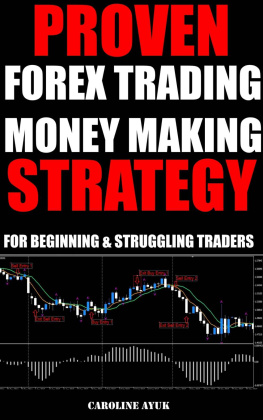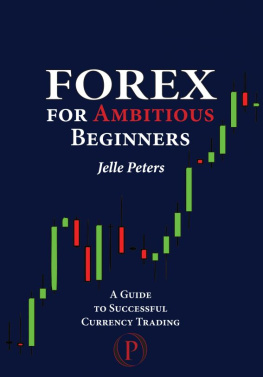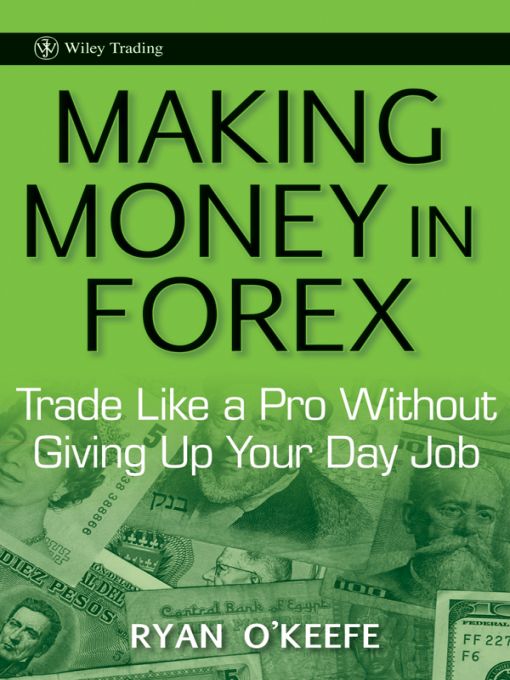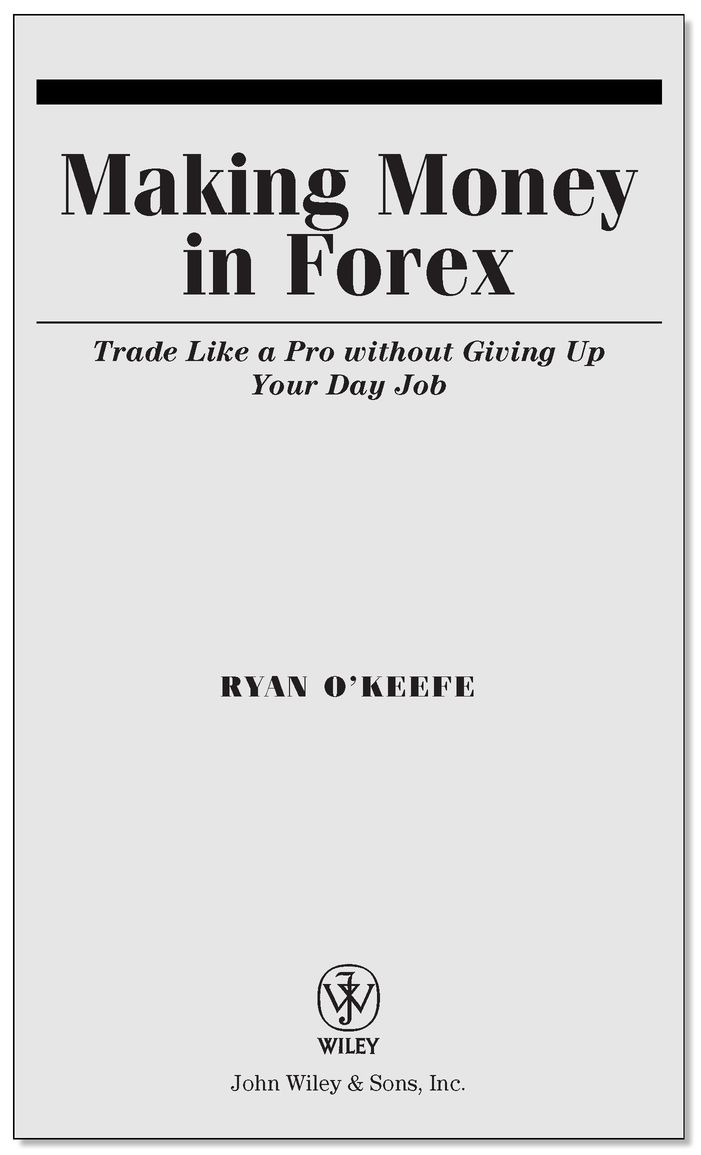Table of Contents
Founded in 1807, John Wiley & Sons is the oldest independent publishing company in the United States. With offices in North America, Europe, Australia and Asia, Wiley is globally committed to developing and marketing print and electronic products and services for our customers professional and personal knowledge and understanding.
The Wiley Trading series features books by traders who have survived the markets ever changing temperament and have prosperedsome by reinventing systems, others by getting back to basics. Whether a novice trader, professional or somewhere in-between, these books will provide the advice and strategies needed to prosper today and well into the future.
For a list of available titles, visit our Web site at www.WileyFinance.com.
This work is dedicated to my beautiful wife, Christine. I am forever grateful for your love, friendship, strength, and commitment. I would not be the trader I am today without you. Thank you for your patience, encouragement, and assistance, making this book a reality. I couldnt have done it without you! I love you!
Preface
When I was introduced to trading, the Internet was young, charts connected directly to data providers via dial-up modem, and trades were placed over the telephone. I met a currency futures trader who introduced me to the market and taught me some basic technical analysis techniques, and I was hooked. I decided to focus on off-exchange spot currency trading versus futures for reasons Ill discuss in Chapter 1. In those days, $100,000 lots and account minimums created a problem for me. I was 17 years old, just graduating high school, and I was broke. I needed to raise trading capital, so I did what any technology-savvy high school graduate did during the Internet boom: I joined the revolution.
I began trading while I worked full-time and sought help from my local book store. I found a plethora of books focused on day trading but nothing that helped me navigate the 24-hour currency market around my day job. These books were written by people who claimed to trade full-time or Wall Street types who spent their entire day glued to a chart. Their methods depended on the volatility offered by active trading sessions and were completely useless to me. I lived in the Central Time Zone, so I was asleep while London traded and at work while New York traded. I tried staying up late and getting up early, and I even tried trading via a mobile device, but ultimately short-term trading wasnt a sustainable solution for me. Day trading may have sex appealpromising Learjets, Lamborghinis, and limited work weeksbut day trading isnt an option for someone who is stuck in a staff meeting when the market is roaring.
WHY NOT TRADE FOR A LIVING?
Today I do not trade for a living. I am too risk-averse to rely solely on income from trading. Trading is a tough business, and there are no shortcuts to success. Youve probably noticed that many of the appointed gurus in the trading business work for currency dealers, or have other income interests. There is a reason for that: Trading is a fickle business. Investment gains are never linear, and some months are better than others. Even when a trader does everything correctly and according to his plan, he might have nothing to show for it at the end of the month. I say this because I want to be realistic and up front with you rather than implying that trading presents a rosy, get-rich-quick scenario.
The trading business is also exposed to government regulatory changes that can dramatically alter the way business is done. The spot market has traditionally been unregulated, but traders in the United States are beginning to feel the pinch of increased regulation. The CFTC Reauthorization Act enacted within the Food, Conservation and Energy Act of 2009, commonly known as the Farm Bill, sought to clarify and enhance the Commodity Futures Trading Commissionss jurisdiction over off-exchange currency trading. Since then, the CFTC has wasted no time enacting new regulations through the National Futures Association. The National Futures Association (NFA) recently enforced two new rules significantly altering the way some traders conduct business. First-in/first-out (FIFO) order execution forced some dealers to eliminate the availability of stop and limit orders on individual positions. I concede that those dealers have execution systems that exacerbated the problem, but it wasnt an issue until FIFO was handed down by the NFA. The NFA also eliminated the ability to hedge currencies in a single account. Many traders chose to move their trading accounts overseas, where the rules do not apply. As I write this, the CFTC is proposing new restrictions on margin requirements that will impact traders using leverage greater than 10:1. The proposed leverage restrictions have the potential to force many retail currency traders into overseas accounts, where margin restrictions are not as strict. The point here is how quickly this business can be altered by government regulators.
Regulation changes are not the only threat to the trading business. Taxation changes have the potential to severely impact profitability: H.R. 1068 is currently working its way through the House of Representatives. Conveniently titled Let Wall Street Pay for Wall Streets Bailout Act of 2009, the legislation seeks to impose a 0.25 percent tax on any financial transaction subject to the exclusive jurisdiction of the Commodity Futures Trading Commission. Retail currency transactions are now directly under the jurisdiction of the CFTC, therefore it isnt a stretch to imagine taxes imposed through currency dealers. Government changing the playing field while the game is being played remains a threat to the trading business and could get worse in the wake of the global financial crisis.
TRADING FOR RETURNS
I believe in diversification and prefer to diversify my income as I would my investment portfolio. Although I enjoy currency trading tremendously, it remains a cog within my investment strategy, which ranges from stocks to real estate.
I am not alone. There are many other traders who are not trading to pay their water bill each month. Ive met many traders I would consider professional grade who are perfectly content at their day jobs. Many of these traders are managing their own retirement portfolios or supplementing an employer-sponsored retirement or pension plan. Still other traders speculate in the currency market to raise investment or discretionary cash. Learning to trade currency using the long-term methods in this book may offer an opportunity to supplement traditional investment vehicles. Whatever your motivation for trading, the methods in this book can help you achieve your trading goals.
Im not trying to scare you away from trading for a living. If you are personally comfortable with the risks associated with trading for a living, then by all means go for it. Many people do indeed earn all their income from trading, and there is no reason you cant, too. My goal is to mentor you into becoming a professional-grade trader; what you do with this information is up to you.
WHY THIS BOOK?
I wrote this book to help people learn to trade around day jobs they cant quit cold turkey. It contains the experience and methods Ive developed after nearly a decade of analyzing, trading, and writing about the spot currency market. The books objective is to persuade you from chasing profit all over a five-minute chart and learn to trade using a steady, long-term approach.


